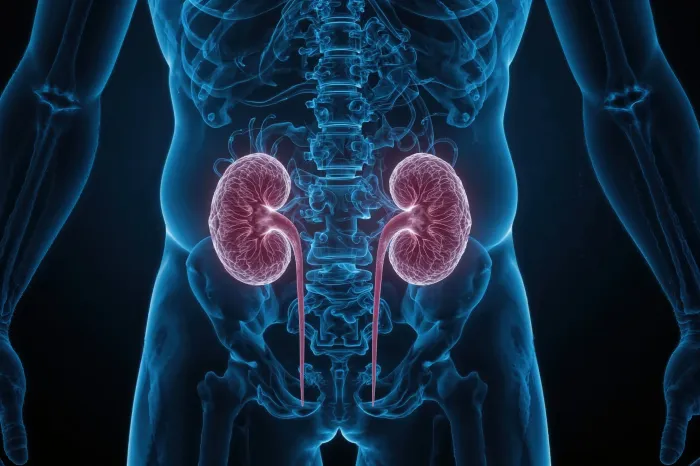Acute Kidney Failure Symptoms and Treatment Options
Learn to identify the key symptoms of acute kidney failure (AKI), a sudden and serious condition. Discover the critical treatment options available to help restore kidney function and prevent long-term damage. Get the facts on diagnosis and what to do next.

Written by Dr. Siri Nallapu
Reviewed by Dr. Rohinipriyanka Pondugula MBBS
Last updated on 13th Jan, 2026

Kidneys play a vital role in filtering waste and excess fluids from our blood. When they suddenly stop working properly, it leads to a condition called acute kidney failure (AKF) or acute kidney injury (AKI). This can be a serious health concern, but with timely treatment, many people recover fully.
In this article, we’ll discuss:
• What is acute kidney failure?
• Common symptoms to watch for
• Causes and risk factors
• Treatment options
• Prevention and lifestyle tips
What is Acute Kidney Failure?
Acute kidney failure happens when your kidneys lose their ability to filter waste from your blood suddenly—within hours or days. Unlike chronic kidney disease (which develops slowly over years), AKF occurs rapidly and requires immediate medical attention.
How Does It Affect Your Health?
When kidneys fail, harmful toxins and fluids build up in your body, leading to complications like:
1. Swelling in legs, ankles, or face
2. High blood pressure
3. Electrolyte imbalances (affecting heart and muscles)
4. Fluid overload in the lungs (difficulty breathing)
Symptoms of Acute Kidney Failure
Early signs may be mild, but they can worsen quickly. Watch out for:
1. Reduced urine output – Urinating less than usual
2. Swelling – Especially in legs, ankles, or around the eyes
3. Fatigue & weakness – Feeling unusually tired
4. Shortness of breath – Due to fluid buildup in lungs
5. Confusion or dizziness – Caused by toxin buildup
6. Nausea & vomiting – Loss of appetite
7. Chest pain or pressure – In severe cases
When to See a Doctor?
If you notice these symptoms—especially reduced urine output, swelling, or breathing difficulties—seek medical help immediately.
What Causes Acute Kidney Failure?
AKF can happen due to three main reasons:
1. Reduced Blood Flow to Kidneys
Conditions that decrease blood circulation to the kidneys:
Severe dehydration
Blood loss (from injury or surgery)
Heart disease or heart attack
Severe infections (sepsis)
2. Direct Kidney Damage
Certain diseases and toxins can harm kidney tissues:
Infections (like severe COVID19 or kidney infections)
Medications (NSAIDs, antibiotics, contrast dyes)
Autoimmune diseases (lupus, vasculitis)
Severe allergic reactions
3. Urine Blockage
When urine can’t leave the body, pressure builds up in the kidneys:
1. Kidney stones
2. Enlarged prostate (in men)
3. Bladder or urinary tract blockages
Who is at Risk?
Some people are more likely to develop AKF, including those with:
1. Chronic kidney disease
2. Diabetes or high blood pressure
3. Heart disease
4. Liver disease
5. Older age (65+)
6. Recent surgery or hospitalization
Diagnosis: How is AKF Detected?
Doctors use tests to confirm AKF:
1. Blood tests (check creatinine and urea levels)
2. Urine tests (look for protein or blood)
3. Ultrasound or CT scan (check for blockages)
4. Kidney biopsy (in rare cases)
If you suspect kidney problems, book a kidney function test through Apollo 24|7 for quick and accurate results.
Treatment Options for Acute Kidney Failure
Treatment depends on the cause and severity. The goal is to restore kidney function and prevent complications.
1. Treating the Underlying Cause
• Dehydration → IV fluids
• Infections → Antibiotics
• Blockages → Surgery or catheter
2. Dialysis (If Needed)
• If toxins build up dangerously, temporary dialysis helps filter blood artificially until kidneys recover.
3. Medications
• Diuretics – Help remove excess fluid
• Electrolyte management – Correct imbalances
• Blood pressure control – Protect kidneys
4. Dietary Changes
• Limit salt & potassium (avoid bananas, oranges, processed foods)
• Reduce protein intake (to ease kidney workload)
• Stay hydrated (unless advised otherwise)
Can Acute Kidney Failure Be Prevented?
While not all cases are avoidable, you can lower your risk by:
1. Staying hydrated – Drink enough water daily
2. Managing chronic conditions – Control diabetes, BP
3. Avoiding NSAIDs – Painkillers like ibuprofen can harm kidneys
4. Monitoring medications – Check with your doctor
5. Eating a balanced diet – Less salt, more fresh foods
Recovery & LongTerm Outlook
Many people recover fully if treated early. However, severe cases may lead to chronic kidney disease (CKD). Followup care is crucial to monitor kidney health.
When to Consult a Specialist?
If you have a history of kidney issues or experience recurring symptoms, consult a nephrologist (kidney specialist) for personalized care.
Final Thoughts
Acute kidney failure is a serious but often treatable condition. Recognizing symptoms early and seeking medical help can make a big difference. If you or a loved one has risk factors, stay vigilant and maintain kidney-friendly habits.
Need expert advice?
Book a consultation with Apollo 24|7’s kidney specialists for guidance and treatment options.
Stay informed, stay healthy!
Disclaimer: This article is for informational purposes only. Always consult a healthcare provider for medical advice.